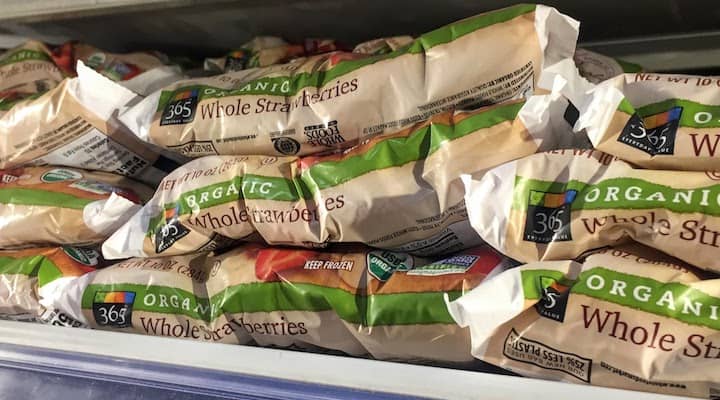
Given the emphasis on fresh fruit and vegetables in grain-free diets like Paleo and Whole30, an early question I had was whether I could supplement fresh fruit with frozen fruit when it’s not readily available fresh. Given that in some seasons it’s hard to find fresh fruit where I live
Is Frozen Fruit Paleo? Packaged frozen fruit is Paleo as long as nothing other than the fruit itself is listed in the ingredients. Absolutely no sugar, sauces or preservatives should be listed. For example, frozen fruit is recommended in a smoothie recipe on Dr. Cordain’s Paleo Diet Insider Newsletter.
There are situations where frozen fruit is a better choice as a Paleo staple than fresh fruit,
Allowed Paleo Frozen Fruits
To confirm that frozen fruit is allowed, I found the following Paleo bigwigs promoting frozen fruit as part of a healthy diet:
- Loren Cordain, often credited as the founder of the modern Paleo diet, has included frozen fruit as part of a smoothie recipe on his Paleo Insider newsletter.
- Sarah Ballentine (of The Paleo Mom website and creator of the Paleo AIP diet) lists frozen fruit as a suggested money-saving option in her Paleo principles Costco guide. She also mentions “Frozen vegetables can have more nutrients than fresh vegetables from the grocery store because the ones in the produce aisle tend to be picked before they are ripe and lose nutrients during shipping and storage before they make it into your cart”, of which the exact same thing can be said about frozen fruit.
- Mark Sisson (promoter of the Primal diet) recommends frozen cherries as one of his healthiest fruit choices recommendations.
And in terms of the Whole30:
- Melissa Hartwig explains that although fresh fruit can be eaten as a main part of the Whole30, she does caution that although frozen fruit is allowed, examples like frozen grapes are easy to overdo and should be eaten cautiously with the best approach to incorporate frozen fruit into recipes or as a side as part of a complete meal.
When to Choose Frozen Fruit over Fresh on a Paleo Diet
In the chart below we outline some of the considerations when making a decision between fresh versus frozen fruit at different times of the year:
| Best | Fruit at a Local Farmers Market Available in-season | harvested when fully ripe | Minimal transport time | can be frozen for use later in the year |
| Better | Local Seasonal Fruit at Health Food/Grocery Store Available in-season | possibly harvested fully ripe | medium transport time | can be frozen for use later in the year |
| Better | Frozen Fruit, Preferably Organic Available year round | harvested when fully ripe | transport occurs after freezing which locks in nutrients |
| Good | Fresh Fruit at Health Food/Grocery Store Available mostly |
This guidance is based on the findings of studies done on the loss of vitamins and minerals in the process of freezing versus consuming fruit fresh. They took the same exact fruit and split it into two parts, some which they would freeze and some which they would use to emulate the trip and timing that produce typically takes to your local store. After testing both samples for vitamin loss they came to the below conclusion:
Overall, the vitamin content of the frozen commodities was comparable to and occasionally higher than that of their fresh counterparts.
Source: Vitamin Retention in Eight Fruits and Vegetables: A Comparison of Refrigerated and Frozen Storage
Minerals and fiber were analyzed in a separate study including frozen and fresh strawberries and blueberries:
The retention of nutrients was highly dependent on the commodity, but the majority of the commodities showed no significant difference between fresh and frozen for all analytes.
Mineral, fiber, and total phenolic retention in eight fruits and vegetables: a comparison of refrigerated and frozen storage.
Steps to Get Paleo/Organic Frozen Fruit from the Field to the Grocery Store
One of the really interesting aspects of modern frozen fruit is the practice of freezing the fruit right at the time it’s picked in the field. As you can see in the below video, it tends to be the same people picking the fruit who are loading it directly into a conveyer belt for freezing.
This is a very attractive aspect of frozen fruit, given that fruit tends to lose nutrients right after harvest. Freezing tends to suspend this loss for most nutrients.
You will notice that this video mentions they wash the fruit in an chlorinated water solution. Some other sources state that fruit is washed with water, so this part can vary.
Paleo Frozen Fruit Smoothies – Wash the Fruit?
One surprising finding I came across when doing research on frozen fruit was a recommendation to wash frozen fruit before using it, even organic frozen fruit! This is despite the fact that companies wash fruit as part of the freezing and packaging process.
I have to admit this is not something I have been doing myself. One of my favorite ways to use organic frozen fruit from the supermarket is to put it directly into the blender to make Paleo frozen fruit smoothies.
Apparently, according to the experts you should do a second rinse of all the frozen fruit before adding the fruit to your blender as a best practice. Who knew!
Sneaky Ingredients to Look Out For in Frozen Fruit
Here are some ingredients to look out for that are sometimes added to frozen fruit. These ingredients would make a particular brand of frozen fruit not allowed on Paleo and/or Whole30 and you should seek out an alternative brand:
- Sugar
- Corn Syrup
- Avoid if possible: xanthan gum, guar gum
The following additives in frozen fruit, although possible to avoid, are technically Paleo and/or Whole30 compliant:
- Ascorbic Acid
- Citric Acid
Freezing Paleo Friendly Fruit Yourself
One of the recommendations I have seen frequently from Paleo bloggers is to make your own frozen fruit rather than buying packaged frozen fruit from the supermarket.
They do have a point, if you want to be absolutely certain which ingredients were used in the preparation of frozen fruit, if you do it yourself, you will know.
This would make the most sense for those who live on a fruit orchard, but even for those with access to a great farmers market in their area, this can be a great approach. Basically you would stock up on your favorite fruit when it is in peak season, possibly by buying from a farmer you know and trust, and then freeze the fruit to be used for the rest of the year.
The advantage of this approach is that you would know the fruit was picked at the peak of freshness, and if you coordinate with the farmer directly or pick the fruit yourself, you can ensure you get your hands on the fresh fruit and freeze it soon after it is picked (this would be
On the other hand, for those of us who would either struggle to buy fruit in bulk during it’s peak season, or even more common, those of us who simply don’t have the freezer space to stock pile our frozen fruit all year for the times that we might need it, there are some downsides with this approach.
For those of us with limited time and/or freezer space, purchasing frozen fruit is likely the closest we can get to the above approach. Luckily, the companies that package frozen fruit do claim they attempt to pick fruit at the peak of the season when the fruit is fully ripe and freeze it that same day. And nutrition experts tend to agree with this claim.
Related Questions
Does frozen fruit have more sugar than fresh fruit? According to nutritionvalue.org nutrition data, unsweetened frozen fruit does not have more sugar than fresh fruit. For example per 100g unsweetened frozen raspberries have 4.4 grams of sugar versus 4.4 for fresh, unsweetened frozen strawberries have 4.6 grams of sugar versus 4.9 for fresh.
Is frozen fruit allowed on Whole30? Unsweetened frozen fruit is technically allowed on Whole30 but should be eaten cautiously. According to Melissa Hartwig, an example frozen fruit, frozen grapes, would be easy to overdo. Fresh whole fruit can be eaten more liberally on Whole30, while frozen fruit is grouped with dried fruit.
Are frozen strawberries Keto friendly? Unsweetened frozen strawberries are keto friendly, however you will want to limit the amount you eat each day to the same quantity you would eat fresh strawberries. Carbohydrate and sugar content tends to be almost identical between unsweetened frozen strawberries and fresh strawberries.
Are frozen raspberries keto friendly? Unsweetened frozen raspberries are keto friendly to the same extent that fresh raspberries are. Both have almost identical amounts of sugar and net carbohydrates whether fresh or frozen. Raspberries are one of the more keto friendly berries due to their relatively low sugar content and high fiber.
